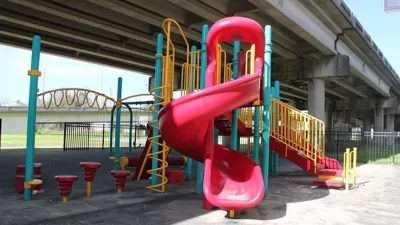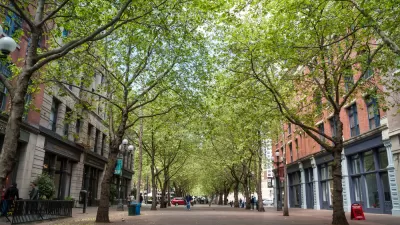Despite the well-documented impacts of traffic noise and pollution, Vancouver's housing policy effectively relegates multi-family apartment buildings to busy arterial roads.

"Instead of planning for housing options in locations that maximize the health and well-being of residents, policymakers are mandating that people who prefer more compact, energy-efficient, and lower-cost homes can only live on traffic-choked arterial streets—and must suffer all the bad health consequences," writes Daniel Oleksiuk of Vancouver's housing policy that recommends the construction of new multi-family apartment buildings on arterial roads as a "buffer" for noise and pollution. Yet research increasingly shows the detrimental impacts of exposure to traffic pollution, such as respiratory disease, cancer, and mental health impacts.
"This November, Vancouver City Council will vote on the Secured Rental Policy, a proposal to legalize six-story rental apartments on busy arterial roads and four-story rentals on the adjacent side streets." According to Oleksiuk, "[u]nless the draft Secured Rental Policy is amended to open up more of the city to multi-dwelling homes, Vancouver’s official position will remain clear: renters are fodder for protecting those fortunate enough to own detached houses on big lots."
Although some families might prefer to live on arterial streets close to public transit, Oleksiuk argues that "[t]he issue at play is one of choice: arterial streets should not be the only places where families living on lower incomes should be able to afford." With most Vancouver renters priced out of the single-family and condo markets, apartment dwellers are unfairly exposed "to the increased health risks that come from living on busy, arterial roads."
FULL STORY: CONFINING RENTAL HOMES TO BUSY STREETS IS A DEVIL’S BARGAIN

Planetizen Federal Action Tracker
A weekly monitor of how Trump’s orders and actions are impacting planners and planning in America.

San Francisco's School District Spent $105M To Build Affordable Housing for Teachers — And That's Just the Beginning
SFUSD joins a growing list of school districts using their land holdings to address housing affordability challenges faced by their own employees.

The Tiny, Adorable $7,000 Car Turning Japan Onto EVs
The single seat Mibot charges from a regular plug as quickly as an iPad, and is about half the price of an average EV.

Seattle's Plan for Adopting Driverless Cars
Equity, safety, accessibility and affordability are front of mind as the city prepares for robotaxis and other autonomous vehicles.

As Trump Phases Out FEMA, Is It Time to Flee the Floodplains?
With less federal funding available for disaster relief efforts, the need to relocate at-risk communities is more urgent than ever.

With Protected Lanes, 460% More People Commute by Bike
For those needing more ammo, more data proving what we already knew is here.
Urban Design for Planners 1: Software Tools
This six-course series explores essential urban design concepts using open source software and equips planners with the tools they need to participate fully in the urban design process.
Planning for Universal Design
Learn the tools for implementing Universal Design in planning regulations.
Smith Gee Studio
City of Charlotte
City of Camden Redevelopment Agency
City of Astoria
Transportation Research & Education Center (TREC) at Portland State University
US High Speed Rail Association
City of Camden Redevelopment Agency
Municipality of Princeton (NJ)





























